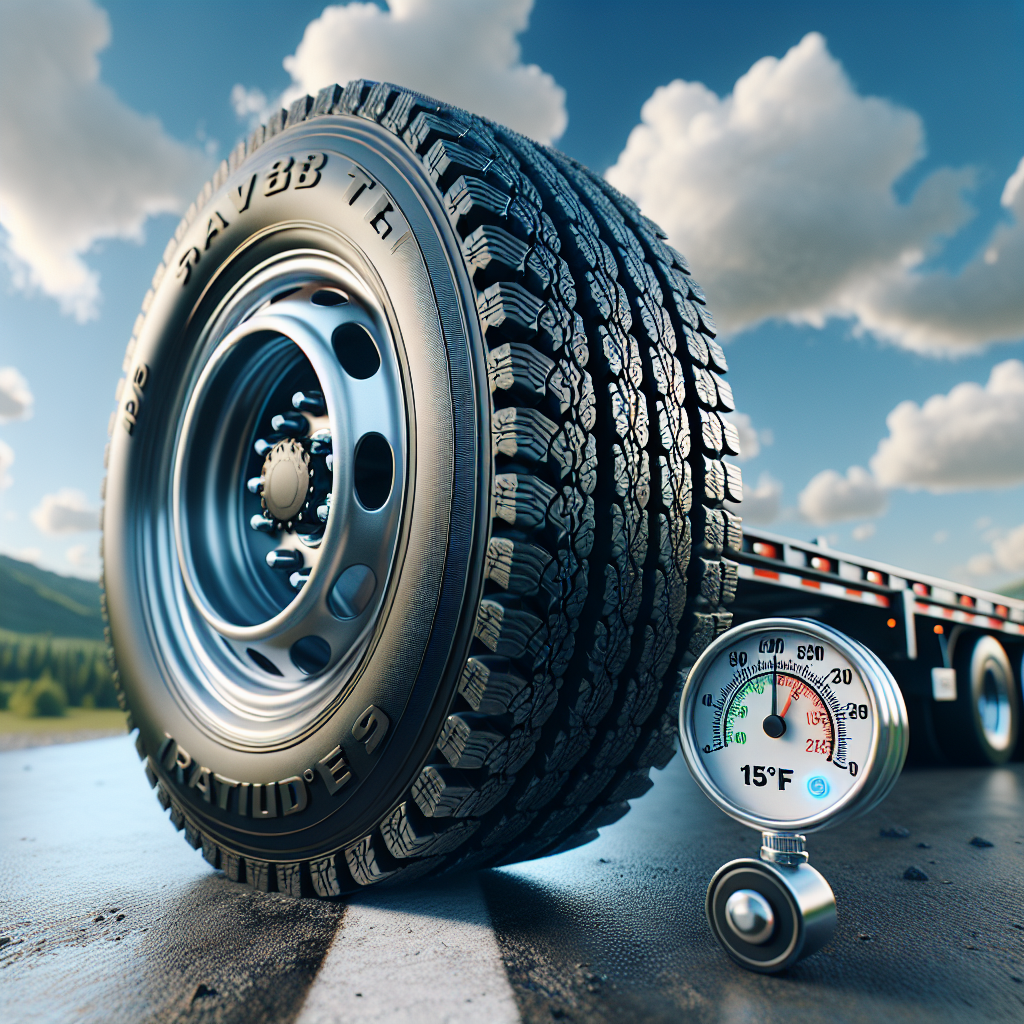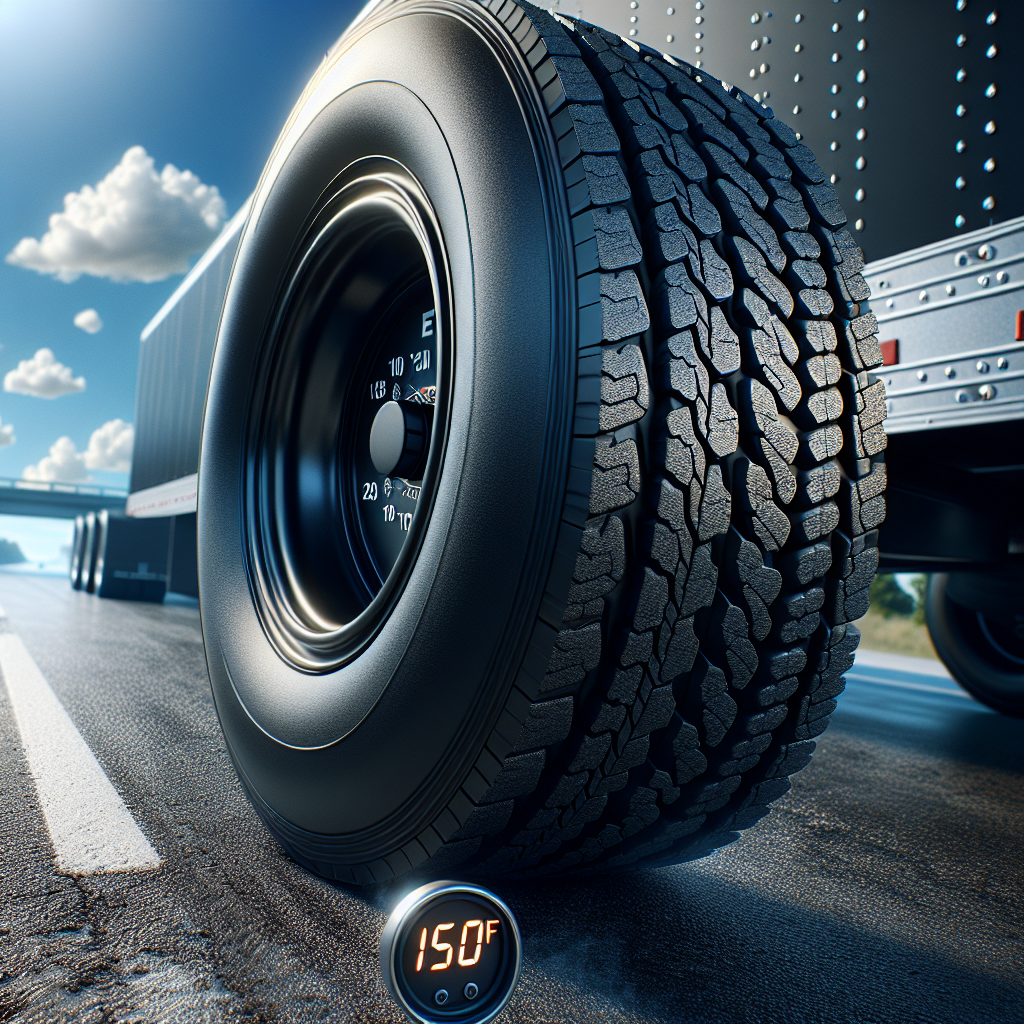Maintaining the maximum trailer tire temperature is crucial for ensuring safety and efficiency while on the road. Tires are the only contact point between your trailer and the ground, making their condition paramount. As the trailer moves, friction builds up, generating heat which can lead to increased tire pressure and, ultimately, tire failure if not monitored properly.
So, what exactly is the maximum trailer tire temperature you should be aware of? Most experts agree that the ideal operating temperature for trailer tires should not exceed 140°F to 160°F. Beyond this range, you risk damaging the tire structure, which could result in blowouts or loss of control while towing. Regularly monitoring tire temperature helps prevent these critical issues.
To effectively manage tire temperatures, consider implementing a tire monitoring system. This allows you to receive real-time updates about tire conditions, ensuring you can act before a situation becomes dangerous. Here are some benefits of tire temperature monitoring:
- Prevention of catastrophic tire failures
- Increased safety for you and other road users
- Extended tire lifespan
- Improved fuel efficiency
Tow with peace of mind, knowing that trailerwatchdog is standing guard. For more information on how to enhance your trailer's safety with advanced monitoring technology, visit trailerwatchdog.com.
Factors Affecting Tire Temperature in Trailers

Understanding the various factors affecting tire temperature in trailers is essential for maintaining optimal performance and safety. Several elements can contribute to rising tire temperatures, and being aware of them can help you prevent potential issues.
Here are some key factors that influence tire temperature:
- Load Weight: The weight of the load being towed plays a significant role in tire temperature. Overloading a trailer increases the strain on tires, leading to higher temperatures due to excess friction.
- Tire Pressure: Proper tire pressure is crucial. Under-inflated tires generate more heat because they flex more as they roll. Conversely, over-inflation can also lead to uneven wear and increased temperatures.
- Speed: Higher speeds can cause tires to heat up rapidly. The faster you travel, the more friction is generated, leading to increased tire temperatures.
- Road Conditions: Rough or uneven road surfaces can elevate tire temperatures due to increased rolling resistance. Similarly, driving on hot pavement can further exacerbate the situation.
- Ambient Temperature: Weather conditions also play a role; hot weather can lead to higher tire temperatures, especially if combined with other factors like heavy loads and high speeds.
By keeping these factors in mind, trailer owners can take proactive measures to manage tire temperatures effectively and ensure a safer towing experience.
Consequences of Excessive Tire Temperatures

Excessive tire temperatures can lead to a range of serious consequences that not only compromise the performance of your trailer but also pose significant safety risks. Understanding these consequences of excessive tire temperatures is crucial for any trailer owner aiming to maintain a safe and efficient operation.
Here are some of the major repercussions of overheating trailer tires:
- Tire Blowouts: One of the most immediate dangers is the risk of a blowout. When tires exceed their maximum temperature limits, they can fail suddenly, leading to loss of control and potential accidents.
- Increased Wear and Tear: High temperatures accelerate tread wear and can cause uneven degradation. This results in a shorter lifespan for your tires, necessitating more frequent replacements and increasing overall maintenance costs.
- Decreased Fuel Efficiency: Overheated tires can create additional rolling resistance, which in turn can decrease fuel efficiency. This means more trips to the gas station, ultimately raising your operational costs.
- Damage to Trailer Components: Excessive tire temperatures can also lead to heat transfer that may damage other components of the trailer, such as brakes and axles, causing even more extensive repairs.
- Compromised Safety: Beyond mechanical failures, the overall safety of towing can be severely compromised. This not only endangers the driver and passengers but also other road users.
Being aware of these potential consequences emphasizes the importance of actively monitoring tire temperatures to prevent catastrophic failures while on the road.
How to Monitor Tire Temperature Effectively

Monitoring tire temperature effectively is essential for ensuring the safety and longevity of your trailer. With the right tools and techniques, you can easily keep track of tire temperatures and take proactive measures to prevent overheating. Here are some key strategies for effective tire temperature monitoring:
- Use Tire Temperature Sensors: Installing dedicated tire temperature sensors is one of the most efficient ways to monitor tire heat. These sensors provide real-time data, allowing you to track temperatures remotely and receive alerts if they exceed safe limits.
- Visual Inspections: Regular visual inspections can help you identify signs of excessive heat, such as discoloration or abnormal wear patterns. Checking the tire sidewalls for bulges or cracks can also indicate overheating.
- Infrared Thermometers: A handheld infrared thermometer can be an excellent tool for quickly checking tire surface temperatures. This method allows you to pinpoint hot spots and quickly assess whether a tire is operating within safe parameters.
- Monitor Load and Pressure: Ensuring that your trailer is not overloaded and that tire pressures are maintained at recommended levels is crucial. Overloading and under-inflation can significantly increase tire temperatures, leading to potential failures.
- Regular Maintenance Checks: Schedule routine maintenance that includes tire checks. This ensures that any issues related to overheating are caught early, allowing for timely interventions.
By implementing these monitoring techniques, you can not only maintain optimal tire performance but also enhance the overall safety of your trailer. Investing in effective monitoring solutions can make a significant difference in preventing tire-related incidents on the road.
Best Practices for Maintaining Optimal Tire Temperatures
Maintaining optimal tire temperatures is crucial for the safety and efficiency of your trailer. Here are some best practices that can help you achieve this:
- Regular Tire Pressure Checks: Keeping tires inflated to the manufacturer’s recommended pressure is vital. Under-inflated tires can heat up more quickly, increasing the risk of blowouts. Utilize a reliable pressure gauge to check tire pressure before each trip.
- Monitor Load Distribution: Ensure that the load is evenly distributed across the trailer axles. Imbalanced loads can cause certain tires to bear more weight, leading to increased friction and higher temperatures. Proper load management not only optimizes tire performance but also extends their lifespan.
- Avoid Overloading: Adhering to the weight limits specified by the trailer manufacturer is critical. Overloading can lead to excessive heat buildup and tire failure. Always double-check the weight of your cargo before hitting the road.
- Utilize Quality Tires: Invest in high-quality tires designed for your specific application. Premium tires typically offer better heat resistance and durability, which can significantly reduce the risk of overheating.
- Implement Regular Maintenance: Schedule periodic tire rotations and alignments. This helps ensure uniform wear and addresses any misalignment that could lead to increased friction and heat generation.
- Stay Informed: Keep abreast of weather conditions, as extreme temperatures can affect tire performance. Plan your routes and trips accordingly, avoiding overly hot conditions when possible.
By following these best practices, you can maintain optimal tire temperatures, ensuring safer journeys and minimizing the risk of tire-related issues during travel.
Conclusion on Maximum Trailer Tire Temperature

Understanding and maintaining the maximum trailer tire temperature is essential for every trailer owner. Elevated tire temperatures can lead to severe consequences, including tire blowouts, decreased handling performance, and increased wear and tear. It is crucial to monitor tire temperatures diligently, particularly during long hauls or in extreme weather conditions.
By implementing practices such as regular tire pressure checks, proper load distribution, and investing in quality tires, you can significantly reduce the risk of overheating. Additionally, utilizing advanced monitoring systems can offer real-time data on tire and axle temperatures, allowing you to make informed decisions while on the road.
With the right knowledge and tools, you can ensure that your trailer operates safely and efficiently. Tow with peace of mind, knowing that trailerwatchdog is standing guard. For more information on how to keep your trailer smart and secure, visit trailerwatchdog.com.








